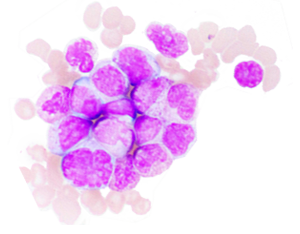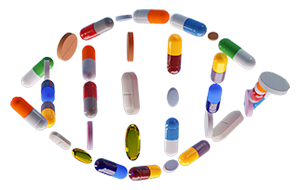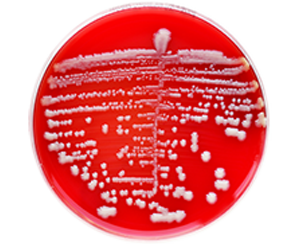Featured Tests
Discover our extensive test menu and broad range of tests for diagnosis and clinical management.
Why Choose ARUP?
Clinical Relevance
Adherence to National Comprehensive Cancer Network (NCCN) guidelines for mutation profiling in myeloid malignancies ensures accurate, industry-standard results.
Cost-Effective, Comprehensive Panels
Our comprehensive panels provide cost-effective detection of diagnostic, prognostic, and therapeutic biomarkers.
Latest Technology
Next generation sequencing enables detection of targeted gene mutations and genome-wide CNVs in a single assay.
Identification of one or more clonal genetic abnormalities, variants, or patterns of variants may aid in the diagnosis, classification, prognosis, and clinical management of myeloid malignancies.
| 2011117 | Myeloid Malignancies Mutation Panel by Next Generation Sequencing |
ARUP’s myeloid malignancies mutation panel covers the spectrum of clinically relevant sequence variants. This test detects diagnostic, prognostic, and therapeutic biomarkers in myeloid malignancies such as acute myeloid leukemia (AML), myelodysplastic syndromes (MDSs), myeloproliferative neoplasms (MPNs), and MDS/MPN overlap disorders such as chronic myelomonocytic leukemia (CMML).
NEW Test
| 3016621 | Myeloid Malignancies Mutation and Copy Number Variation Panel by Next Generation Sequencing |
ARUP’s myeloid malignancies mutation and copy number variation assay uses next generation sequencing to detect sequence variants, copy number changes (gains or losses), and copy number-neutral loss of heterozygosity (CN-LOH). In addition to targeting specific genes, this assay detects and reports relevant copy number variants (CNVs) down to 5 Mb from across the genome. This test covers all the latest variants relevant for diagnosis and classification, as well as emerging biomarkers that may inform clinical management.
|
ARUP Test Code and Name |
Genes or Alleles Assesseda |
|---|---|
|
2011117 Myeloid Malignancies Mutation Panel by Next Generation Sequencing |
ANKRD26; ASXL1; ASXL2; BCOR; BCORL1; BRAF; CALR; CBL; CBLB; CEBPA; CSF3R; CUX1*; DDX41; DNMT1*; DNMT3A; ELANE; ETNK1; ETV6; EZH2; FBXW7; FLT3; GATA1; GATA2; GNAS; HNRNPK; IDH1; IDH2; IL7R; JAK1; JAK2; JAK3; KDM6A*; KIT; KMT2A; KRAS; LUC7L2; MPL; NOTCH1; NPM1*; NRAS; NSD1; PHF6; PIGA; PPM1D; PRPF40B; PRPF8; PTPN11; RAD21; RUNX1; SAMD9; SAMD9L; SETBP1; SF3B1; SH2B3; SMC1A; SMC3; SRSF2; STAG2; STAT3; STAT5B*; SUZ12*; TET2; TP53; U2AF1; U2AF2; UBA1; WT1; ZRSR2 |
|
3016621 Myeloid Malignancies Mutation and Copy Number Variation Panel by Next Generation Sequencing |
Includes the genes listed above, plus:
Coverage of note:
|
|
aOne or more exons are not covered by sequencing for the indicated gene. |
|
Why Choose ARUP?
Expert Consultation
Consult with our medical directors on test selection and results interpretation.
Clinical Relevance
Access testing that is curated for maximum clinical relevance.
Enhanced Reporting*
Opt for additional reporting that provides drug-dosing guidelines based on your patient’s genetic profile.
*Available for select tests
Benefits of Pharmacogenomic Testing
Avoids Adverse Reactions
- Genotype-guided treatment using pharmacogenomics significantly reduces the incidence of clinically relevant adverse drug reactions.
Reduces Cost
- Systematic review of studies that assessed the cost-effectiveness of pharmacogenomic testing for drugs with existing recommendations based on genetic markers concluded that pharmacogenomic testing was either cost-effective or cost saving.
Expedites Therapeutic Success
- Biomarker-guided therapy achieved through pharmacogenomic testing accelerates time to therapeutic success and leads to improved patient compliance with drug therapy.
|
ARUP Test Code and Name |
Genes or Alleles Assessed |
|
3004255 Cytochrome P450 Genotyping Panel, with GeneDose Access |
CYP2B6, CYP2C19, CYP2C8, CYP2C9, CYP2D6, CYP3A4, and CYP3A5 |
|
3006366 Pharmacogenetics Panel: Psychotropics, with GeneDose Access |
ANKK1, COMT, CYP2B6, CYP2C19, CYP2C9, CYP2D6, CYP3A4, CYP3A5, DRD2, GRIK4, HTR2A, HTR2C, MTHFR, OPRM1, and UGT2B15 |
|
3001524 Cytochrome P450 Genotyping Panel |
CYP2B6, CYP2C19, CYP2C8, CYP2C9, CYP2D6, CYP3A4, and CYP3A5 |
|
3004471 Pharmacogenetics Panel: Psychotropics |
ANKK1, COMT, CYP2B6, CYP2C19, CYP2C9, CYP2D6, CYP3A4, CYP3A5, DRD2, GRIK4, HTR2A, HTR2C, MTHFR, OPRM1, and UGT2B15 |
|
3001513 CYP2D6 |
CYP2D6 |
|
3001501 CYP2C8, CYP2C9, and CYP2C cluster |
CYP2C8, CYP2C9, and CYP2C |
|
3001508 CYP2C19 |
CYP2C19 |
|
3001518 CYP3A4 and CYP3A5 |
CYP3A4 and CYP3A5 |
|
2012166 Dihydropyrimidine Dehydrogenase (DPYD), 3 Variants |
DYPD |
|
3001535 TPMT and NUDT15 |
TPMT and NUDT15 |
|
3001541 Warfarin Sensitivity (CYP2C9, CYP2C cluster, CYP4F2, VKORC1) Genotyping |
CYP2C9, CYP2C cluster, CYP4F2, VKORC1 |
|
0051684 Glucose-6-Phosphate Dehydrogenase (G6PD) 2 Mutations |
G6PD |
|
3004457 Glucose-6-Phosphate Dehydrogenase Deficiency (G6PD) Sequencing |
G6PD |
|
2002429 HLA-B*57:01 for Abacavir Sensitivity |
HLA-B*57:01 |
|
2012049 HLA-B*15:02 Genotyping, Carbamazepine Hypersensitivity |
HLA-B*15:02 |
|
2008767 Opioid Receptor, mu OPRM1, 1 Variant |
OPRM1 |
|
2008426 SLCO1B1, 1 Variant |
SLCO1B1 |
|
0051332 UDP Glucuronosyltransferase 1A1 (UGT1A1) Genotyping |
UGT1A1 |
References
- Jarvis JP, et al. Real-world impact of a pharmacogenomics-enriched comprehensive medication management program. J Pers Med. 2022;12(3):421.
- Swen JJ, et al. A 12-gene pharmacogenetic panel to prevent adverse drug reactions: an open-label, multicentre, controlled, cluster-randomised crossover implementation study. Lancet. 2023;401(10374):347–56.
- Morris SA, et al. Cost effectiveness of pharmacogenetic testing for drugs with Clinical Pharmacogenetics Implementation Consortium (CPIC) guidelines: a systematic review. Clin Pharmacol Ther. 2022;112(6):1318–28.
Why Choose ARUP?
Earliest Detection
Our tests enable the identification of drug-resistant virus populations at lower concentrations to provide the best likelihood of early detection.
Guidance for More Drugs
Our assays sequence hundreds of gene variants to provide guidance relating to all available antiviral drugs.
Reduced Turnaround Time
Next generation sequencing interrogates multiple targets simultaneously, accelerating the reporting of results.
Custom Reporting Solutions
Our custom software solution interfaces with the gold standard database to provide up-to-date reporting with meaningful, intuitive insights that guide therapy.
Transplant Medicine: Cytomegalovirus Drug Resistance by Next Generation Sequencing
Cytomegalovirus (CMV) infection is one of the most serious infectious complications of transplantation. The development of drug-resistant CMV is associated with significant morbidity. ARUP’s testing ensures antiviral resistance is identified early and accurately, which is essential for optimal treatment. Learn more.
| 3004615 | Cytomegalovirus Drug Resistance by Next Generation Sequencing, Ganciclovir, Foscarnet, Cidofovir, Maribavir, and Letermovir |
HIV Drug Therapy: Human Immunodeficiency Virus 1 (HIV-1) Drug Resistance by Next Generation Sequencing
The detection of mutations that confer resistance to antiretroviral drugs is critical for selecting effective HIV treatment regimens. The results of ARUP’s tests guide individualized treatment strategies to prevent immune system damage, prolong life expectancy, and improve quality of life.
| 3003853 | Human immunodeficiency Virus 1 Drug Resistance by Next Generation Sequencing |



















